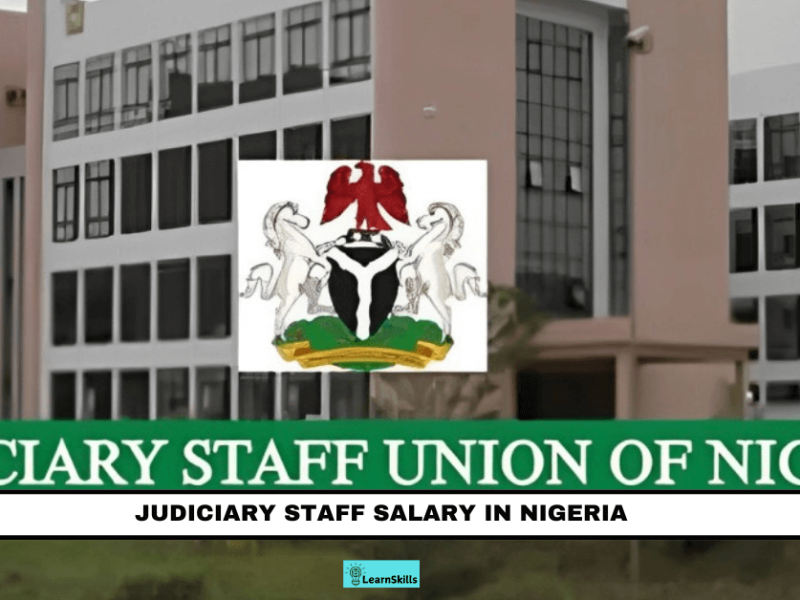In Nigeria, the salaries of judiciary staff reflect the value placed on the country’s legal system. Judicial officers, including justices of the Supreme Court and the Chief Justice, have seen a notable salary increase of 300% recently.
With the new salary structures, the Chief Justice earns about N64 million annually, while Supreme Court justices receive around N4.2 million per annum.
Understanding the financial aspects of the judiciary can give you insight into how the legal system functions and evolves in response to societal needs.
Overview of Nigerian Judiciary Structure
The Nigerian judiciary consists of several layers of courts that handle various legal matters. Each court has distinct functions and jurisdiction, which are essential for understanding how justice is administered in Nigeria.
Supreme Court
The Supreme Court is the highest court in Nigeria. It has ultimate appellate jurisdiction over all legal matters in the country. The court interprets the Constitution, ensuring the law is followed. Justices are appointed by the President, and their decisions are final.
The Supreme Court also hears cases involving significant constitutional issues. The court comprises a Chief Justice and at least 20 other justices. Its rulings set important legal precedents for lower courts.
Court of Appeal
The Court of Appeal serves directly below the Supreme Court. It reviews decisions made by lower courts when parties appeal them.
The Court of Appeal consists of the President and several justices. Cases are typically heard in panels of three or more judges. This structure allows for a thorough review of cases and promotes fair hearings throughout the judiciary.
Federal High Court
The Federal High Court focuses on matters governed by federal law. It handles cases involving the enforcement of fundamental rights, tax issues, and trade disputes. This court has jurisdiction over matters that cross state lines.
Judges in the Federal High Court are appointed by the President. It is critical for maintaining consistency in federal law across Nigeria. The court supports the country’s economic framework by addressing commercial matters effectively.
National Industrial Court
The National Industrial Court specializes in labor and employment disputes. It handles cases involving conditions of employment, trade disputes, and issues related to unions. This court ensures that workers’ rights are protected under Nigerian law.
Judges here are experts in labor relations and employment law. Their role is vital for maintaining a fair working environment in Nigeria.
FCT High Court
The Federal Capital Territory (FCT) High Court administers justice in the FCT, including Abuja. This court handles matters related to civil and criminal law within its jurisdiction. It functions similarly to state high courts.
Judges in the FCT High Court are appointed at the federal level. Cases can include anything from family law to real estate disputes. The court plays a key role in addressing legal issues specific to the capital.
Customary Court
Customary Courts deal with cases based on the customs and traditions of Nigeria’s various ethnic groups. They handle matters such as marriage, divorce, land disputes, and inheritance issues. This court system allows for traditional practices to be recognized legally.
Customary Courts are found at local levels and are accessible to all. Judges are often respected community leaders who understand local customs.
Salary Structure for Judicial Staff
In Nigeria, the salary structure for judicial staff varies significantly among different positions. Here’s a closer look at what each role earns and the breakdown of their compensation.
Chief Justice of Nigeria
The Chief Justice of Nigeria (CJN) has a comprehensive salary package. The CJN earns an annual salary of ₦64 million, which breaks down to about ₦5.3 million per month.
This amount includes both a basic salary and allowances. The basic salary is ₦1.1 million monthly, while additional allowances total around ₦4.3 million. This makes the CJN one of the highest-paid judicial officials in Nigeria, reflecting the importance of the role in the judicial system.
Chief Judge
The Chief Judge’s salary may vary depending on the state. Typically, a Chief Judge receives a monthly package totaling around ₦4 million to ₦5 million.
This includes a basic salary and various allowances for administrative duties and operational costs. The Chief Judge plays a vital role in overseeing court operations, and their salary reflects the significance of their responsibilities in leading the judiciary at the state level.
Judicial Officers
Judicial officers, including justices of the Supreme Court, are compensated based on their rank and position. For example, justices of the Supreme Court earn about ₦4,213,192.54 annually.
This figure encompasses their basic salary and other allowances. As judicial officers, they are responsible for making critical legal decisions and interpreting laws, which justifies their substantial pay.
Judiciary Workers
Judiciary workers, which include clerks and support staff, typically earn less than the judicial officers and judges. Their salaries can range widely, but many report earning around ₦100,000 to ₦200,000 monthly.
Efforts are underway to negotiate better salaries for these workers, reflecting their essential role in the judicial process. The Judiciary Staff Union of Nigeria (JUSUN) is actively engaging with the government for salary enhancements, emphasizing the need for fair compensation.
Remuneration and Allowances
Judiciary staff in Nigeria receive a structured package that includes salaries, allowances, and various benefits aimed at supporting their welfare. These components are essential for attracting and retaining qualified personnel in the judicial system.
Benefits and Welfare
Judiciary staff enjoy several benefits that enhance their professional and personal well-being. Key benefits include:
- Health Insurance: Comprehensive health coverage for staff and their dependents.
- Housing Allowance: Financial support for housing arrangements, ensuring comfortable living conditions.
- Pension Scheme: A structured pension plan that secures financial stability after retirement.
These benefits aim to support your needs and make working within the judiciary more appealing.
Notably, the salary for judicial officers has seen recent adjustments, ensuring competitive compensation aligned with the prevailing economic conditions.
Leave Allowance
Leave allowance is an important aspect of remuneration for judiciary employees. This includes:
- Annual Leave: You are entitled to paid leave that typically lasts for up to 30 days each year.
- Sick Leave: Paid sick leave is provided to support you when health issues arise.
- Study Leave: Opportunities for unpaid leave to pursue further education or training in legal studies.
These allowances ensure that you have the time to rest, recover, or improve your professional skills without financial penalties.
Compensation structures also consider a review to enhance these provisions periodically.
Challenges Facing Judiciary Staff
Judiciary staff in Nigeria face several significant challenges that impact their work and well-being. Key issues include financial autonomy, capacity constraints, and the frequency of industrial actions.
Financial Autonomy and Independence
Financial autonomy is crucial for the judiciary staff to function effectively. Currently, many judiciary staff members face delays in salary payments. Neglected financial entitlements leave public servants struggling to meet basic needs.
The situation is exacerbated by poor governance and a lack of budgetary allocations specific to the judiciary.
Judges and other staff often depend on state governments for funding, leading to inconsistencies. This dependence can create a power imbalance where financial issues interfere with their duties.
Capacity and Integrity Issues
Capacity problems also plague the judiciary. Many staff members lack the necessary resources and training to execute their roles properly. This under-resourcing can lead to operational inefficiencies that affect the entire judicial process.
Moreover, integrity issues arise when staff face corruption pressures, often linked to salary disparities.
When salaries are low, there is a higher chance of malpractice. Ensuring adequate pay may help enhance integrity and diminish corruption rates among judiciary staff.
Industrial Action
Industrial action among judiciary staff, led by the Judiciary Staff Union of Nigeria (JUSUN), has become more common. Staff often strike to demand better pay and working conditions.
Recent actions draw attention to the serious salary crisis, with strikes sometimes stretching for weeks due to unmet demands.
These strikes not only disrupt legal proceedings but also highlight the frustration judiciary staff feel regarding their treatment. When such actions occur, they reflect deep-rooted issues within the system. The result is a judiciary that struggles to maintain public trust and deliver justice effectively.
Recent Developments in Judiciary Staff Compensation
Recent changes in Nigeria’s judiciary staff compensation reflect growing concern for fair wages and improved working conditions. The focus has been on adjustments in the minimum wage and various government interventions aimed at addressing salary disparities.
Minimum Wage Adjustments
In Nigeria, the National Minimum Wage plays a crucial role in determining salaries for various sectors, including the judiciary.
Recent proposals suggest increasing judges’ salaries by up to 300%, which aims to align their pay with rising living costs. This significant wage adjustment could influence not only judges but also other judicial staff, ensuring better compensation across the board.
Stakeholders, including the Judiciary Staff Union, have shown support for these proposals, highlighting the need for fair pay.
Government and Judicial Interventions
The Federal Government has taken steps to address salary delays within the judiciary.
Recently, the Abia State branch of the Judiciary Staff Union of Nigeria suspended a three-week strike after full payment of outstanding salaries. This indicates a commitment to resolving wage issues for judiciary staff.
Additionally, the Senate has passed bills aimed at increasing judges’ salaries. This ensures that compensation reflects both the responsibilities and demands of their roles.
This involves more than just salary increments. It also includes allowances to support judiciary staff in fulfilling their duties effectively.
Such measures are essential for maintaining judicial integrity and enhancing the overall functioning of the legal system in Nigeria.










